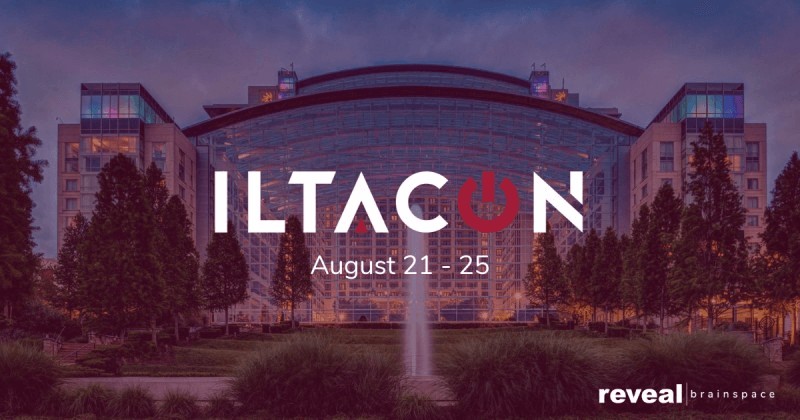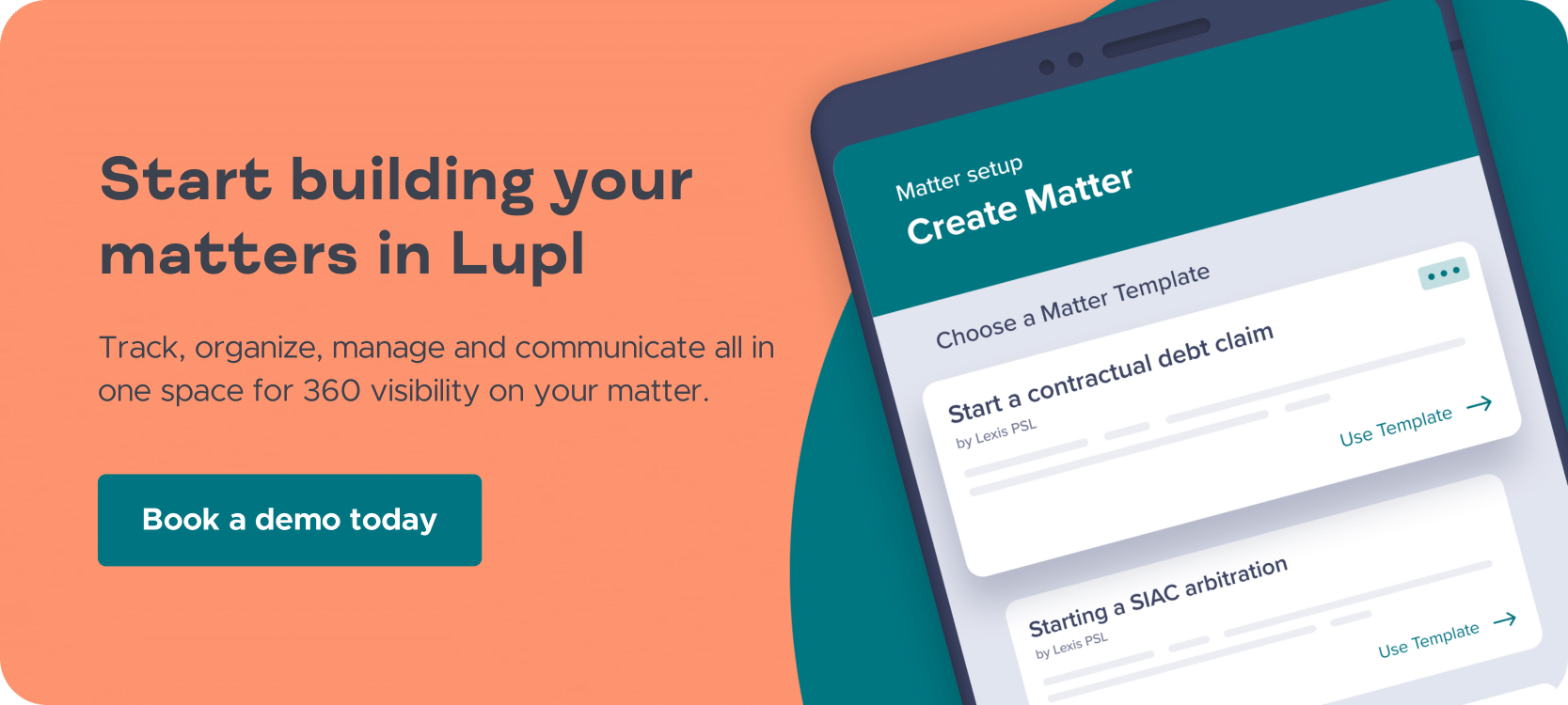Lupl at ILTACON 2022: Our 4 Key Takeaways

This year’s International Legal Technology Conference (ILTACON) has come and gone, with more than 3,000 attendees passing through its virtual and physical doors. If you don’t know ILTACON, you should: it’s a globally-renowned conference dedicated to bringing technological transformation to the legal industry. So it was no surprise that myself and others in the Lupl team came along— we too are committed to driving technological change in law!
It’s no secret that this change has been a long time coming. Throughout my time in the industry, I’ve heard the same conversations on technology over and again: should law outsource their technology or keep it in house? Should law embrace the cloud? Indecision, delay and lack of legal-specific tech has meant that only 60% of legal professionals report using cloud services,1 the same rate of adoption seen among other professional services back in 2016.2
But this year’s ILTACON showed how things are changing. Over the four-and-a-half day conference, filled with speeches, discussions and networking (and even a bit of superhero fancy dress), I was struck by people’s openness and curiosity — to technology and to a new approach to work.
As pioneers in legal tech, we at Lupl were delighted not just to attend but also to contribute. We sponsored a Women Who Lead session with former CIA officer Melissa Mahle, and I was thrilled to moderate a session on the Great Resignation, gleaning insights from the panel on why people are waving goodbye to their law firms, or even legal entirely. (Spoiler: technology plays a role here, too).
So without further ado, here’s my rundown of the key takeaways from ILTACON 2022…
Connecting people with technology
The question that has been circulating in legal over the last year (and beyond) was brought to the forefront at this year’s conference: how can legal connect people with technology?
People’s desire to get interconnected with tech is nothing new. Maybe you saw this blog on LinkedIn or scrolling Twitter. After you read this, you might switch to WhatsApp to message someone. Tech is everywhere. And it’s the same in legal. Well, maybe it’s not just about scrolling Twitter, but it is about connecting people so they can get what they need to get done, done.
This theme came up time and again during the conference. Dan Tacone and Warren Knowles from Intapp demonstrated how their software strives to connect people, processes and data. Ari Treuhaft showed how the app Litify is designed to enhance firm-client collaboration. And, of course, we at Lupl were demonstrating how our legal project and matter management software finds the interconnectedness sweet spot.
Today, where people are spread across the globe but need to work together, information and know-how must be shared easily and securely.
This means streamlining communication between practice support teams and eDiscovery service providers. It means mitigating the risks of sharing large, sensitive files via email between real estate brokers, title companies, and their clients. It means alleviating the pain points of multi-jurisdiction matters across the globe. And it means connecting organizations who wouldn’t otherwise be able to collaborate in real time behind their firewalls. It’s about joining legal operations, law firms and service providers — you get the picture.
Incidentally, this is what Lupl was built for: seamlessly connecting people with technology to transform how legal works.
The platform designed to move legal work forward seamlessly for law firms and legal teams.
Collaboration
How do you collaborate with people when you’re all working in different areas, using different tech and with seemingly different goals? By working through the problem together — with a seat at the table for all the stakeholders. That was the challenge posed to attendees in one session on the ‘Future of the Legal Industry’, hosted by Carl Morrison and Tom Stephenson.
In this session, law firms, legal ops, and legal tech came together to solve some “real-world” scenarios that begged the question: how can we use tech to make legal collaboration effective?
It’s no secret that legal can be an adversarial industry. Understandably, everyone needs to mitigate risk and be confident their workflow is defensible. This adversarial and individual way of working can hinder collaboration. But this activity produced a breath of fresh air, as we demonstrated how those sometimes adversarial parties can work together in pursuit of a common goal — the way it should be.
Those at our table solved the problem with the tools given in the exercise, but we could’ve solved it in one word: Lupl. Designed to solve precisely this problem of collaborating with teams who use different tech, Lupl was created as a vendor agnostic platform. This means that whatever platform you use, thanks to Lupl’s open APIs, you can bring whatever you need to the party. And you can use it easily. Lupl can be a central hub for legal technology, allowing you to pull information from across your tech stack into a single, secure place.
And tech is particularly important to the younger generation…
The younger generation
Remember when you just came out of law school? All bright-eyed and bushy-tailed, ready to make your mark? This year’s ILTACON reiterated that today’s younger generation has that same spark, but also that they’re more determined to shake things up — or, depending on how you see it, push legal into the 21st century.
They don’t want to work from the office all the time. They don’t want to be available 24/7, and they don’t want to be burnt out by their 30th birthday. Imagine being shown sleeping pods on your first day in a law firm! What would that make them think about legal’s dedication to a good work-life balance?
This year’s ILTACON showed that legal finally understands that change is needed, from working practices to creating strategies to retain talent, demonstrated in sessions like:
- Adapt or Die: How to embrace modern working practices in a compliance driven world
- Making New and Current Employees Feel at-home in a Hybrid World
- Winning the Battle in the Talent Wars: Attracting, Retaining and Engaging Employees.
Young lawyers get out of law school armed with knowledge of the letter of the law, but without a grasp of the practicalities of actually working in legal. They’ve got knowledge, but not know-how. In other words, they understand legal theory — but not how a law firm works, what their career path looks like or what tech is available to help them do their job the best they can.
Lupl’s enhanced collaboration is a micro innovation that produces a macro impact, with one of these impacts being the improved sharing of know-how. Lupl help break up silos and do away with keepers, so everyone, including new lawyers, can get the information (both practical and theoretical) that they need.
Legal is changing — and Lupl is helping change it. As a mobile-friendly platform, people can work from wherever they like, creating matters through free templates and updating tasks on-the-go — from wherever they want. (Who said digital nomads can’t also be legal professionals?)
And don’t be fooled by the informality. Across the conference floor, ties weren’t just loosened; some were abandoned. People were talking about their personal lives more freely and sharing insights from their personal experiences over the last two years. Leaders were sharing their failures. New leaders are emerging and the legal world is more diverse than ever before.
We learned that young legal professionals care more about taking a holistic view of their lives, rather than adhering to stuffy and stifling rules about who they’re supposed to be in order to succeed. In fact, they want to work with a sense of purpose and, equally importantly, be able to see a clear path to growth and development.
As discussed in a session I was privileged to moderate, ‘Avoiding the Great Resignation’, it became clear that if lawyers can’t see a clear path to growth, they might end up leaving. And as speaker Nita Cumello mentioned, it’s an illusion to think that what has worked in the past will continue to work in the future — something the younger generation of lawyers understand.
‘Culture is bigger than compensation’
Our discussion on ‘Avoiding the Great Resignation’ took place on the final day of the conference, and it encapsulated one of the key themes of the event. Discussing how to create a culture of positivity and retention, Chris Boyd, Chief Operating Officer at Wilson Sonsini Goodrich & Rosati, noted that geography is no longer the reason for leaving roles, as hybrid and remote working becomes the norm.
The single biggest reason may not surprise you: compensation. But beyond that, the bigger raft of other factors might: feeling valued, prioritising wellbeing and reducing burnout. Basically, it’s all about culture. As Rebecca Morrison from Untangled Happiness put it, ‘culture is a bigger factor than compensation’. Adding to this, Nita explained that these days good compensation is ‘table stakes’. But when it comes to retaining staff and keeping them happy, it’s all about culture and wellbeing.
So how can law firms and departments create a positive culture that values and retains their staff? As Andrew Kent, COO at Page One LLC, said it’s about 3 Es: Engagement, Empathy, and Empowerment. By creating a supportive culture and ‘wearing it as your badge’, you’ll attract the people you want and deter those you don’t. In Chris’ case, his firm let teams set their own hybrid working norm, and take special time off, above and beyond annual leave. This showed the organisation’s empathy, and empowered employees to take more control of their work-life balance.
But we also know how connecting people with technology — to bring it back neatly to the first theme — can support culture and bolster wellbeing. People feel most connected to leadership and their colleagues when in the office, but people want to work and feel connected in a hybrid way too.
Lupl: Bringing together lawyers and legal tech
Going by people’s casual dress on the conference floor, it seems legal might be finally loosening its tie. But this means more than what people are wearing to work. If the takeaways from this year’s ILTACON can spread across the industry, maybe legal is moving away from its conservatism when it comes to embracing tech, away from rigid working practices, and away from a culture that doesn’t prioritize wellbeing.
Lupl can help. A matter management platform that lets you collaborate and share knowledge and know-how inside and outside your firm, Lupl brings together and optimizes your tech stack to make tasks that should seem easy to do, well, actually easy to do.
From matter management templates to get you up and working quickly, bringing together and optimizing existing tech stacks and sharing know-how across your firm, Lupl can help you gain time back, foster a culture of support and wellbeing, and give legal tech its moment in the sun.
Change is in the air — and Lupl is helping drive that change. To find out how Lupl can help improve collaboration, enhance your firm’s culture and seamlessly connect people with transformative legal tech, book a demo today.

2 Disruptive technology in the legal profession | Deloitte UK
More legal tech insights we think you'll love

Q2 2024 Product Update – New Features & Improvement
Lupl is the leading task and project management solution for...

How a team of trainee lawyers streamlined work handovers with Lupl
CMS trainees adopt Lupl's task management tools to enhance work...

